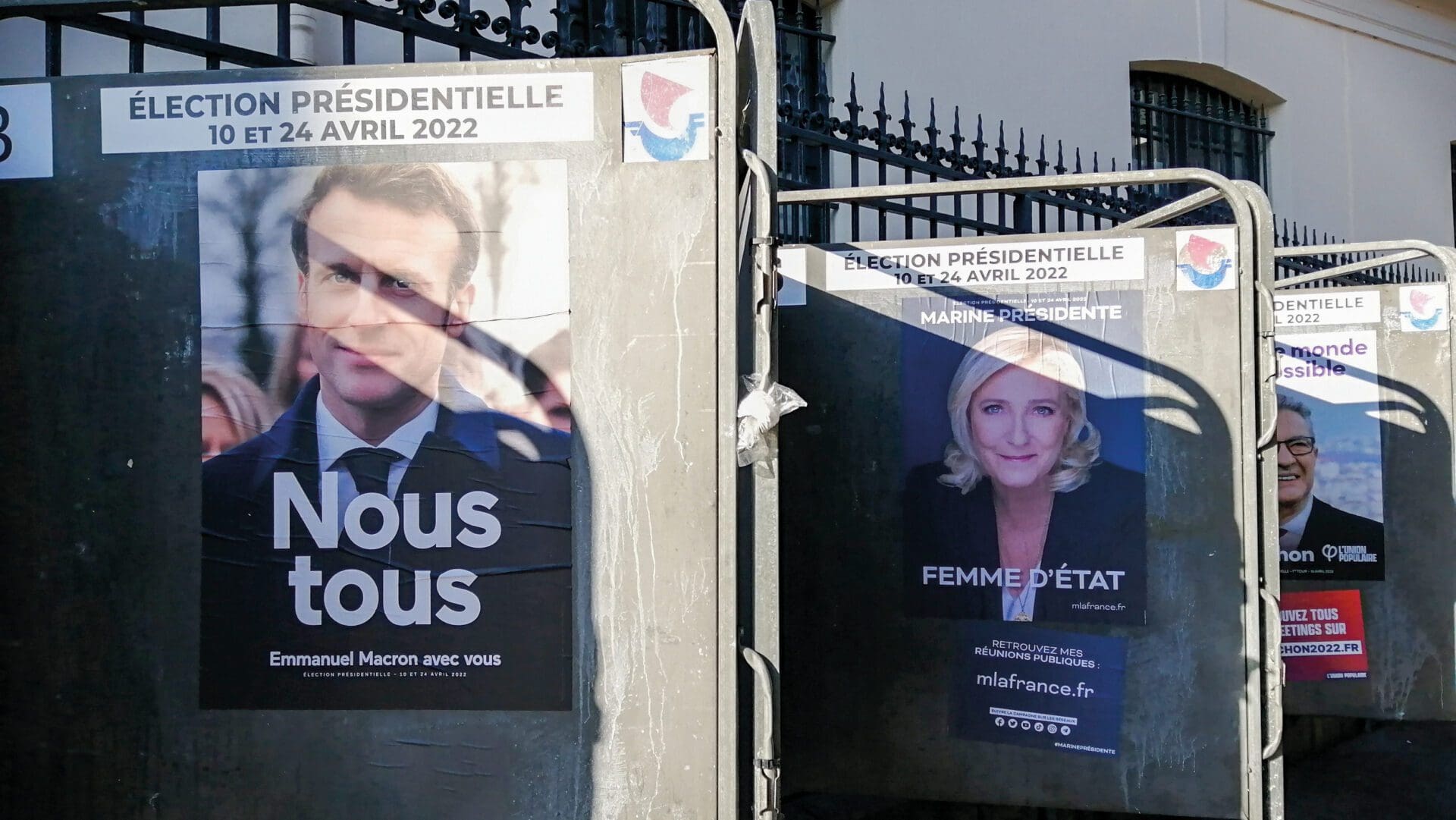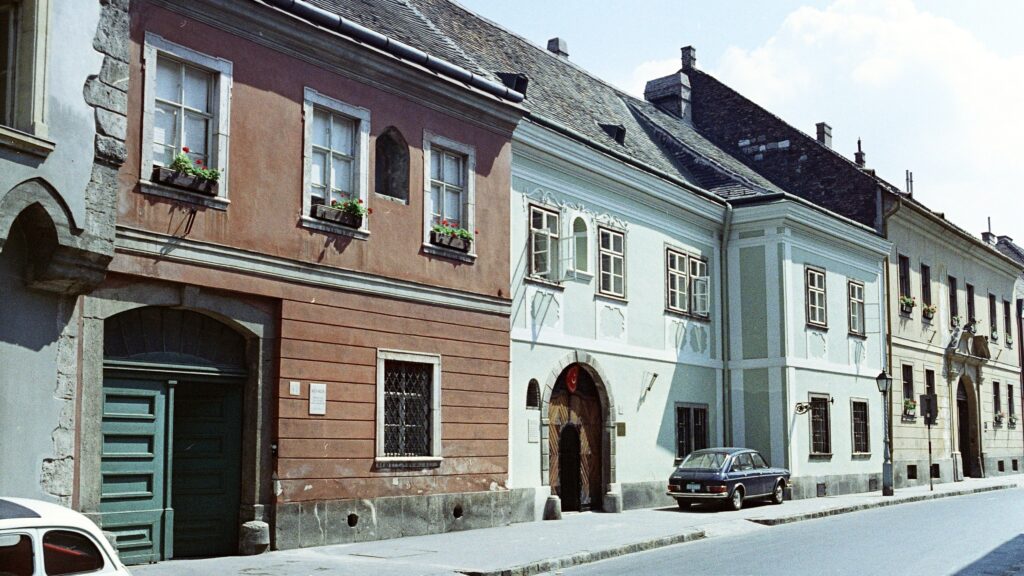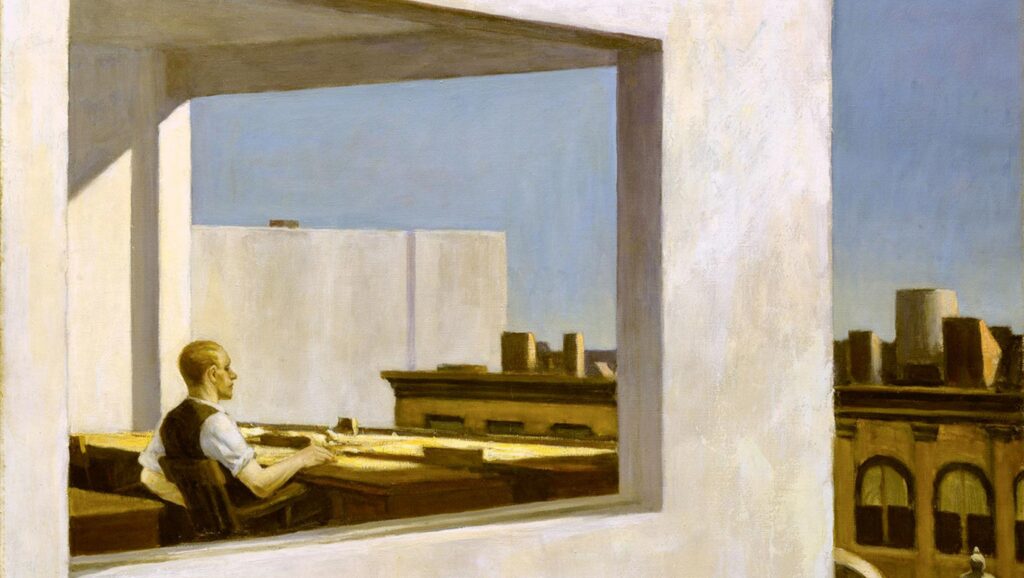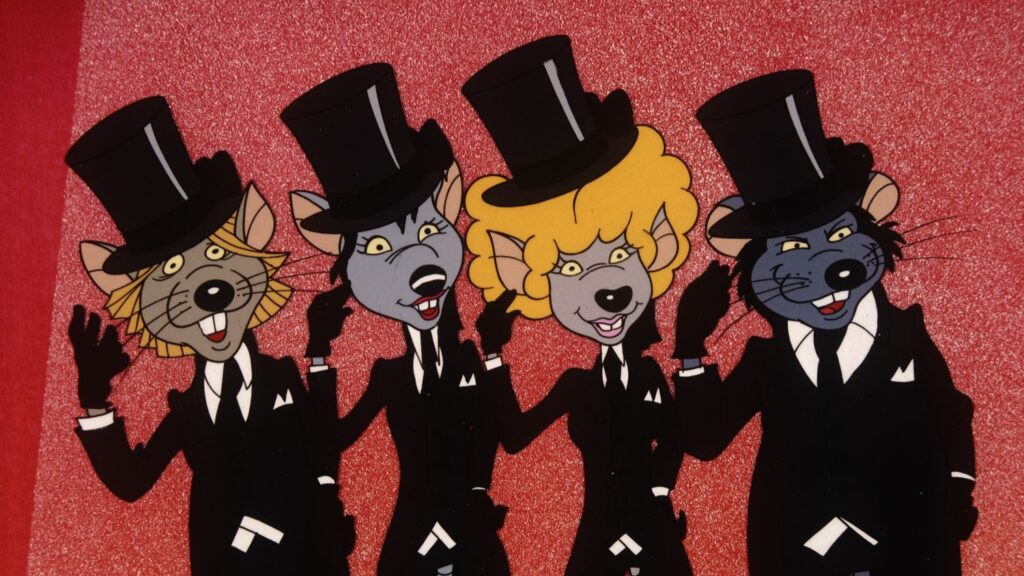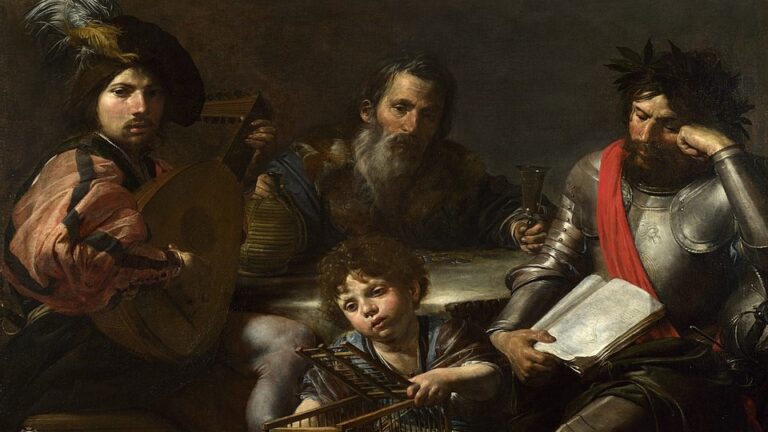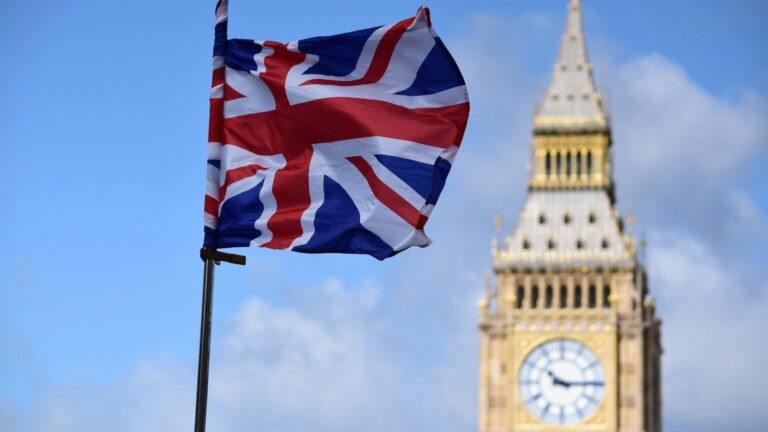This article was published in Vol. 3 No. 1 of the print edition.
A Tale of Two Posters
I live and study in the French city of Reims, a village of roughly 180,000 that is today mostly famous for the surrounding vineyards. However, it should not come as unexpected that ahead of the 2022 presidential elections, Marine Le Pen and her National Rally held their convention here. With its early medieval Romanesque basilique where Clovis himself was baptized, and its omnipotent, gothic Notre Dame that hosted dozens of royal coronations, Reims is an important location for the French Nouvelle Droite. The New Right in France, one could argue, is built on a theoretically taut yet discursively powerful union between the Republic and a more ancient cultural identity. While under the leadership of the younger Le Pen the French New Right has gradually replaced the discourse that once revitalized the brutal memory of Vichy (‘Travail, Famille, Patrie’),1 it still stores, next to the revolutionary experience of 1789, something of the premodern.
During the run-up to the presidential contest, I inevitably came across a lot of campaign posters that, glued side by side, juxtaposed the candidates’ faces and slogans. On one occasion, it struck me that in fact they did far more than that: through the slogans, they revealed two different conceptual worlds whose opposition potentially tells us a lot about the state of affairs not only in France, but also in the Western world.
Macron’s poster read: ‘Nous tous’ (us all). While a couple of my friends insisted that this actually was a powerful communication tool that, through tous, addressed a united France, I still found it terribly weak. Why should I, the viewer, make the mental effort to link tous to the community of Frenchmen? Who specifically is Macron—or his communication staff—talking about? Is it anyone at all?
Yes: Nous tous. He is talking about each one of us, not the nation or any other political community. It might be, and indeed is, very possible due to the broader context (elections are coming), that ‘each one of us’ signals the nation, but this very possibility tells something vital about the language of liberalism: it implies, rather than asserts, it hides things rather than pointing them out. It is indirect and it operates with invisible meanings.
But what is even more important for understanding why Macron’s poster can leave a large majority of people virtually unaddressed is that language has a reality of its own that is independent from the context within which it operates. Whether or not national elections are currently approaching, saying Nous tous transmits the idea of ‘nous tous’ first, and only then can we unpack ‘the nation’. Nous tous is important on its own: it is the chief idea communicated. For a simple passer-by who does not reflect on a mere slogan that reaches the brain, it is in fact the only idea. The universal, frameless community—a boring, discouraging vision. On the other side, Le Pen’s poster reads: ‘Femme d’état’ (stateswoman), a dynamic and interactive statement that joins together the energy from the idea of the new, the idea of a female leader, with the energy from the idea of power and authority—the state.
Of course, Macron won, no one contests that; 58 to 42 per cent—a victory that is confident enough not to be called Pyrrhic. However, analysing it through the larger context, Macron’s victory appears much less of a triumph. Five years ago, he defeated Le Pen with 66 per cent. True, French presidents often do not win a second term, which again puts Macron’s 58 per cent in a favourable light. But this conclusion would utterly miss how radically and deeply the French party system has been transformed in the past decade. For the New Right, it is less its victory or its defeat than its progress or non-progress into the second run that should signal the level of its success. Just ten years ago, it would have been unimaginable for a New Right candidate to face a president and the president alone on TV. This year, she almost earned the gold medal.
Today, the New Right is a political actor—and not only in France, but in the wider West. Most commentators, as they have always done, would link this rise of the New Right to the individual crises, political or financial, that have occurred cyclically in the transatlantic zone, from the Great Recession to the eurozone and migration crises to their more current counterparts, the COVID and energy crises. In this regard, liberalism is opposed when it ceases to deliver.
I argue that the principal reason for the New Right’s triumphant march stems from a far deeper crisis, internal to the current shape of liberalism—its great language crisis. Liberalism today repeatedly proves unable to articulate itself politically, something Macron’s poster reveals. In (not) doing so, it opens up the discursive space for the New Right that in turn exploits that space with enormous linguistic power. This essay is not a normative appreciation of either liberalism or the New Right—I am neither for nor against them in any normative sense. It is rather an intellectually motivated effort to decode, from a linguistic point of view, the decay of a worldview that believed it had won history.
Anti-Political Liberalism
In Book I of Politics, Aristotle defines man: ‘Hence it is evident that the state is a creation of nature, and that man is by nature a political animal. […] Now, that man is more of a political animal than bees or any other gregarious animals is evident. Nature, as we often say, makes nothing in vain, and man is the only animal whom she has endowed with the gift of speech.’ 2
What Aristotle introduces is a classic dispositionist understanding of political behaviour. Man behaves politically because of his nature-endowed capacity to speak. Speech, explains Aristotle, empowers man to conceptualize what is good or bad, just or unjust, useful or useless. Based on these communicated understandings, man associates until he establishes the state—the polis.
The polis, in turn, is defined by its walls. It is no coincidence that in ancient Greek, polis refers to the ‘citadel’ as much as to the state and the administrative centre of the city, where political activities generally took place. Politics as an activity comes about through the separation of one polis from the other, one form of government from the other, one version of the good from the other. It comes about through the wall. At its heart, politics is about conflict and identity.
This original understanding of politics is of course greatly at odds with liberalism, an ideology whose relativizing language renders good and bad, just and unjust, useful and useless merely functional to the individual. The ambition of liberalism is antithetical to the political pursuit of truth: it aims to emancipate every domain of life from such shared conceptions and in turn to assign these domains to the individual.
That is to say, liberalism does not move from the individual to truth, but from truth to the individual. By this logic, liberalism creates a concept-world that is fundamentally depoliticized. ‘We thus arrive at an entire system of demilitarized and depoliticized concepts’,3 writes Carl Schmitt in The Concept of the Political, tracing the emancipative project of liberalism through which everything from religion to the economy is progressively separated from the order of things—the state.
There is one perhaps even more fundamental reason why the language of liberalism is anti-political. For it follows an ethos that is not only relativistic but universalistic. In this regard, it builds on a long tradition in cultural history that was introduced by the Judeo-Christian worldview. This imagines every man created by and in the image of God (Genesis) and therefore bound by the same God-given moral rules (Exodus). This Judeo-Christian idea of a universal self fits well with the Roman idea of jus nature or natural law, creating a solid basis for medieval Occidental civilization. The pope was the worldly representative of universal divine power, which was transferred to kings and lesser feudal lords through sanction and church-assigned divine rights. This universalistic order of the medieval world culminated in the Thirty Years’ War (1618–1648), which broke out due to the aspirations of Ferdinand II, Holy Roman Emperor, to forge a ‘universal monarchy’.
Locke’s social contract theory and its political offspring, liberalism, was built on this same universally ordained world. Only it replaced God with a new deity: natural reason. In modern liberal constitutions and other documents, we tend to find this rearticulated universalism, this switch from Ferdinand’s ‘universal monarchy’ to ‘universal human rights’. Just as swift was the move from the signing of the Declaration of the Rights of the Man and the Citizen in Paris in 1789, to the signing of the Universal Declaration of Human Rights in Paris in 1948—the founding document of the United Nations. For the fundamental logic of liberalism is not in its temporary attachment to any political community such as the French nation, but in its universalistic and perpetual transcendence of the political. It aims to create a universe, not a polyverse. Consequently, its language imagines but does not affirm, it is abstract and not specific, it hides differences and never asserts them.

The Language Crisis of Liberalism
Today, however, something is different. In the past, liberalism could at least find itself a political frame that made its otherwise universalistic language sound political. Whether we think of the national, reformist liberalisms of the nineteenth century or the ‘free world’ liberalism of the Cold War, the universalist language of liberalism seemed to be married to a clear political purpose. It stood united with a national or a civilizational idea that found a particular enemy—whether in absolutist kings or the Soviet Union. That is to say, liberalism could articulate itself politically because of its embeddedness in situations of conflict that assigned liberalism a certain political identity. The friend–enemy relationship, in which Schmitt sees the essence of politics, prevailed.
These days that is no longer the case. Contemporary liberalism is conditioned by its surroundings—globalization, transnational institutions, the EU—to adopt a fundamentally anti-political language, for they themselves are of an anti-political nature. The ‘end of history’ narrative, the ethos of a territorially and culturally detached consumerism, the systems of delegated sovereignty in the pursuit of perpetual peace, the procedure of bureaucratic and mediated problem-solving—these depoliticizing visions and functions all condition today’s liberalism to speak strictly in its own voice: a conflictless, identityless, boring void.
‘Liberalism articulated its own lie, its own false promise concerning human nature: that man can and indeed will live apolitically’
Perhaps the EU is most responsible for the current language crisis of liberalism: it does not just condition liberalism to speak anti-politically but effectively deprives it of something valuable. Indeed, the idea of Europe, now dominated by an ever-depoliticizing ‘pseudo-confederation’,4 could have been an important asset for liberalism as a new political frame to articulate itself through.
Liberalism has ended up caught in its own linguistic trap. Since at its heart it is an anti-political ethos, it cannot articulate itself politically and engagingly in the absence of a clear political embeddedness, a political époque. Its universalistic, ever-expanding and ever-transcending logic has left behind the discursive archetypes to which it was once committed: the nation, Western civilization, etc. (Europe not included here). But now that there is no way forward, now that history has been ‘won’, liberalism cannot tell anything. Nous tous.
As a result, within political discourse it leaves behind a wide space that is being filled by its opponents. How the New Right builds up its own narrative varies from country to country and, at any rate, should be the subject of a later essay. However, one thing is certain: it articulates its claim as a claim for politics.
First, unlike the other way around (far-right, racist, Nazi, etc.), it genuinely reflects on the liberal status quo, and uses its justifiably depoliticizing language (universalism and relativism) and embeddedness (the EU, the UN, globalization) to enhance the already established feeling of remoteness, and develops an idea of radical ‘outness’. That is to say, it develops a coherent idea in relation to the enemy, embodies it (e.g. Brussels, immigrants) and then politicizes these embodiments against its very own sacred terms (nation, sovereignty). There is an us, and there is them.
Then, the New Right creates a bipolarity between the known and the unknown, the trusted and the doubted, the in-world and the out-world, and fills this bipolar world with its own historical topoi, such as the struggle of nations against empires. Thus, the New Right creates an inhabitable narrative realm in which every motif strengthens the other, and in the meantime the whole system of concepts feels true because it is built upon a genuine reflection on liberalism and what it aims to obliterate—the political animal.
Communism fell because it was built on a lie. The ruins of the Berlin Wall in 1989 buried a false promise, a falsity first exposed by a brutal, terroristic inapplicability of ideas, then an agonizing and self-renouncing reconciliation with the world of markets. Indeed, communism was built on a vision that is completely against our hitherto evolved knowledge of human nature. It is ironic that in the moment of its triumph, liberalism articulated its own lie, its own false promise concerning human nature: that man can and indeed will live apolitically. That there is an end to politics. If liberalism is to survive, it has to renavigate its ship from a universalistic, moralizing, abstract and therefore anti-political concept-world into the polis. Escaping its own totalist and hegemonic aspirations, it must become a part of politics: the constant formation and affirmation of who we are.
NOTES
1 J. G. Shields, The Extreme Right in France (Routledge, 2007).
2 Aristotle, Politics (Batoche Books, 1999), 5.
3 Carl Schmitt, The Concept of the Political (The University of Chicago Press, 2007).
4 Francisco Seoane Pérez, Political Communication in Europe (Palgrave Macmillan, 2013).

